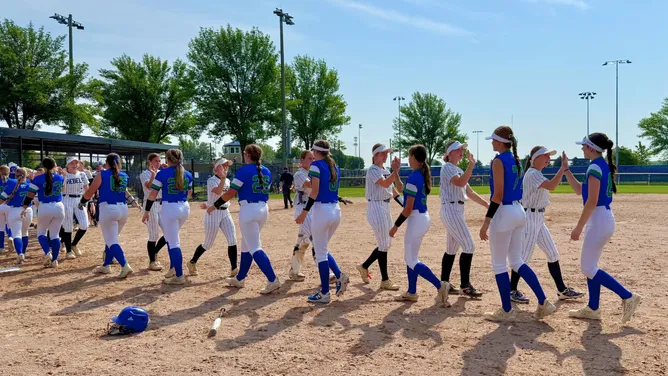Minnesota’s Transgender Pitcher Sparks Debate Over Fairness in Sports
In a heated and polarizing discussion surrounding fairness in high school athletics, Marissa Rothenberger, a freshman pitcher for the Minnesota-based Stonewall High School softball team, has found herself at the center of attention after throwing a shutout in the Minnesota state quarterfinals. While her exceptional performance has garnered admiration from supporters, it has also provoked backlash from critics, including U.S. Representative Tom Emmer, who publicly criticized her achievement in a social media post.
The controversy peaked following Marissa’s standout performance, where she threw a perfect game, leading her team to a decisive victory. Many parents, particularly those from rival teams, expressed concerns about competitive fairness, arguing that it is inappropriate for transgender girls to compete against cisgender girls in sports. This apprehension has led to ongoing debates across the nation about the inclusion of transgender athletes in women’s sports—a conversation that has manifested particularly strongly in Minnesota.
Marissa Rothenberger: A Talent on the Field
Marissa Rothenberger, just 15 years old, has quickly become a household name, not just for her pitching skills but also as a symbol of the larger conversation about gender identity in sports. Since publicly transitioning, Marissa has received a mixture of support and scrutiny. Alongside her parents, she has worked to participate in the activities she loves while showing resilience in facing opposition.
Her high school coach, Carly Anderson, praised Marissa’s performance and dedication. “She practices hard, dedicates time to improving her skills, and genuinely loves the game. We support her entirely,” Coach Anderson stated. However, parents from opposing teams have voiced concerns over the apparent advantages they believe Marissa holds due to her physical attributes and training.
Parents Speak Out
The discourse among parents has sparked heated debates at community meetings and public forums. Lisa Jensen, a parent of a player on a rival team, commented, “It feels like we are playing at a disadvantage. We work hard to compete, and when you see a pitcher throw over seventy miles an hour, you start to wonder if the playing field is really level.”
Despite Jensen’s concerns, other parents vehemently support Marissa. Sarah Kim, another parent, noted, “It’s essential to understand that every athlete deserves the right to play and compete. Marissa is just doing what she loves and happens to be talented at it. We need to focus on supporting our kids rather than tearing others down.”
A Backlash from the Political Arena
The backlash against Marissa intensified when U.S. Representative Tom Emmer took to social media, directly referencing the teen athlete in a post that asked, “Is it fair for biological boys to compete against girls in high school sports?” The implication of the statement sent ripples through the community and ignited further discussions about the role of lawmakers in the lives of young athletes.
Emmer’s comments drew sharp criticism from advocacy groups, including the Human Rights Campaign, which issued a statement affirming that “transgender kids deserve the same opportunities as everyone else.” The statement highlighted the importance of inclusivity in sports and condemned attempts to politicize young athletes’ experiences.
Legal Implications and Ongoing Lawsuit
The furor surrounding Marissa Rothenberger’s success has reached legal levels, as her participation has become the focal point of a lawsuit filed by parents of rival players, claiming that her competitive advantage violates Title IX regulations regarding equitable treatment in sports. While the details of the lawsuit remain contested, the case has significant implications for the rapidly evolving landscape of transgender athletics.
The Minnesota State High School League (MSHSL) has maintained that they support the participation of transgender athletes, citing their policies that allow individuals to compete as their identified gender. This decision, however, has prompted calls for legal reviews and revisions to existing guidelines.
The Wider Context of Transgender Athletes in Sports
Marissa’s experience is not isolated; it forms part of a larger conversation happening nationwide. Many states are grappling with similar issues, ultimately reflecting social beliefs about gender, identity, and rights. As more transgender athletes come forward, balancing the pursuit of fair competition with the encouragement of inclusion becomes an essential challenge.
Not only are high-profile discussions occurring in local communities, but there are also broader references within the legislative frameworks at various levels of government. Approximately 30 states have considered legislation around restricting participation by transgender athletes in recent years, and these discussions are reflected in numerous school and league policies.
The Community’s Response
In the midst of the debate, Stonewall High School has made efforts to foster a sense of unity while backing Marissa. The administration organized a community forum to address concerns, where local leaders discussed the importance of maintaining respectful conversations around such critical issues.
Principal Jenna Thompson said, “Our priority is to create an inclusive environment for all students. We want to find a way where competition remains fair while also being welcoming.” The forum revealed a spectrum of views, but generally leaned towards supporting student inclusivity.
Moving Forward
Marissa Rothenberger’s journey exemplifies the struggles and triumphs of young transgender athletes. As she continues to light up the softball diamond, the conversations surrounding her achievements are indicative of larger societal changes that grapple with the evolving definitions of identity and fairness.
As the lawsuit unfolds and further debates arise, stakeholders in education and athletics will need to consider how to support all athletes while ensuring competitive integrity. The dialogue around Marissa and her remarkable accomplishments may ultimately serve as a defining moment in sports history, ushering in not only policy changes but also a deeper understanding of acceptance and diversity in athletic competition.
Whether parents, lawmakers, or young athletes, it is apparent that the push for a more inclusive sports environment is inevitable, albeit filled with challenges. As Marissa Rothenberger continues to develop her passion for softball, she symbolizes the growing recognition of transgender athletes and the complexities surrounding their rights in competitive sports.







